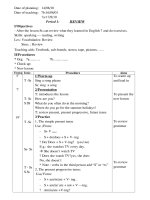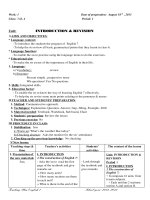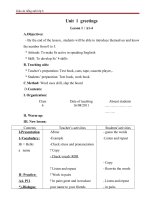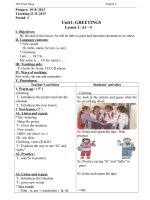Giáo án Tiếng Anh 7 unit 1: Back to school
Bạn đang xem bản rút gọn của tài liệu. Xem và tải ngay bản đầy đủ của tài liệu tại đây (108.71 KB, 16 trang )
GIÁO ÁN TIẾNG ANH 7
UNIT ONE :
A :
Lesson 1 / 2 :
BACK TO SCHOOL
FRIENDS
A1 + 4
A. Aim:
By the end of the lesson Ss will be able to use expressions to greet and introduce to
one another. (Nice to meet you ! ; How is every thing ? ; Just fine / Not bad /
Pretty good ...)
*/ Teaching aids: T’s and Ss’ books , extra-board , tape , cassette.
B. Procedures.
1. Warmer / Revision: Slap the board
My name’s Lan
Bye
Yes , I am
class7
A
verywell,thank
s
- T reads the questions, Ss listen and slap the suitable responds.
- Group-work (2 group )
- Questions : a) What’s your name?
b) How are you today?
c) Which grade are you in?
d) Good bye.
e) Are you a new student?
2. Practice.
a) Matching : (on an extra-board)
Pretty good.
How is every thing?
Nice to meet / see you .
So am I / Me , too.
Just fine.
Rất vui khi gặp bạn.
Tôi cũng vậy.
Khá tốt.
Mọi việc như thế nào?
Không tốt lắm.
Not bad.
Còn bạn thì sao?
How about you?
Bình thường thôi.
- Have Ss practice reading these phrases.
b) Gap-fill (Ex. 4 – P. 12 + 13)
- Have Ss listen to the tape and use the phrases above to complete the
dialogues.
- Ss listen to the tape twice.
- T gets Ss answer and corrects if necessary.
c) Reading – Role play.( Ex. 1- P. 10 )
- Have Ss listen to the tape 2 times (book closed -> book opened)
- Have Ss practice reading the dialogues -> T checks and corrects their
pronunciation if necessary.
- Have Ss find the answers for the questions a)-> c) –P.11.
KEY : a) Her name is Hoa .
b) She is in class 7A.
c) Nam is also in class 7A.
*/ Discussion : Find the different ways to greet one another at different age at
school .
- Pair-work.
3. Production: Mapped dialogue
Ba
Nam
....morning .
.....morning . Nice ...again.
..., too . How ... ?
...thanks ....about ...?
....thank you .
Good bye . See ...
...
4.Homework.
- Write the dialogue in Production on notebook.
- Do exercises 1+2+3 (P.3+4- W.B)
*/ Tape transcript:
a) Mr Tan : Hello, Lien. How are you ?
Miss Lien : Pretty good, thank you. How about you, Tan?
Mr Tan : Not bad, but I’m very busy.
Miss Lien : Me , too.
b) Nam :
Good afternoon, Nga. How is every thing?
Nga :
Ok, thanks. How are you today, Nam?
Nam :
Just fine, thanks.
Nga :
I’m going to the lunch room.
Nam :
Yes. So am I.
UNIT ONE :
BACK TO SCHOOL
A :
FRIENDS
Lesson 2 / 3 :
A2
A. Aim:
By the end of the lesson Ss will be able to read a text talking about Hoa to
understand in details and review about simple presen; comparision; a lot of /many.
*/ Teaching aids : T’s and Ss’ books , extra-board , tape , cassette.
B. Procedures.
1. Warmer: Jumbled words ( on cues )
ntau = aunt
renpast = parents
tuendts = student
veil = live
gib = big
cholos = school
pphay = happy
cleun = uncle
- Group-work. (2 groups)
2. Pre-teach vocabulary .
- diferent (adj): >< similar : khác với
- unhappy (adj): >< happy : không vui , buồn
- miss (v):
nhớ (tàu,xe ) ; nhớ (ai đó )
- stay (v):= live
ở , sống
*/ Checking vocab . : R.O.R
3. Pre-reading.
a) Presentation.
( antonym )
( antonym )
( translation )
( synonym )
- Have Ss look at the picture (P.11)
Questions : Who is this? What is this?
Is she happy or unhappy?
(Ss answer)
b) True / False Predictions.
T / F statements (on an extra-board)
1.Hoa is from Hue.
2.She lives with her parents in Hanoi.
3.She has a lot of friends in Hanoi.
4.She misses her friends in Hue.
5.She is happy now.
- Have Ss read the statements and guess if they are T/F.
4. While-reading.
- Have Ss read the text ( A2- P. 11) and check their prediction.
- T gets Ss answer and corrects if necessary.
KEY : 1. T
2. F – She lives with her uncle and aunt in Hanoi .
3. F – She doesn’t have any friends in Hanoi .
4. T
5. F- She is unhappy .
*/ Comprehention Questions:
GAME : Lucky Numbers
1- L.N
2-b
3- d
4 – L.N
5-a
6-e
7 – L.N
8-c
- Have Ss read the text again and find the answer for the questions ( P.11)
- Group-work. (2 groups)
KEY :
a) She is from Hue.
b) She is staying with her uncle and aunt.
c) No, she doesn’t have any friends in Hanoi.
d) Her new school is bigger than her old school.
e) She is unhappy because she misses her parents and her friends.
2. Post-reading.
*/ Transformation writing : (from the text A2-P.11)
a) For weaker Ss: Change “Hoa” to “I”
Ex : I am a student in class 7A. I am from Hue ....
b) For stronger Ss : Change “Hoa” to “I” and the information.
Ex : I am a new student in ....I am from...and my parents ...
- Ss write individually then T calls some Ss to read out before class-> T
corrects their mistakes if necessary.
3.
-
Homework.
Learn new vocab. by heart.
Write it up (Post-reading )
Do exercise 4( P.4-W.B )
UNIT ONE :
A :
Lesson 3/ 4 :
BACK TO SCHOOL
FRIENDS
A3+5
A. Aim:
By the end of the lesson Ss will be able to practice listening and review about
expressions to greet others .
*/ Teaching aids : T’s and Ss’ books , extra-board , tape , cassette.
B. Procedure .
1. Warmer: Brainstorm
hello
hi
Good
Expressions to greet
morning
...
How is every thing
- Have Ss list then write them on the board.
- T checks and corrects if necessary.
...
How are you ?
2. Pre-listening.
- T uses the picture ( P.12 ) to introduce.
Questions : Who are they?
Are their age different?
Can you guess what they are talking about?
- Have Ss listen to the tape twice. (book closed -> book opened)
- Have Ss practice reading the dialogue ( Role-play ); T corrects their
pronunciation if necessary.
3.While-listening.
- Have Ss run through the four pictures ( A5- P.13 ).
Questions : Who are they?
Where are they?
What are they doing?
(Ss guess and answer)
- T gives the task: You are going to listen to four conversations describing the
four pictures but they are not in the correct order . Let’s listen and write the
letters of the dialogues in the order you hear.
- Have Ss listen to the tape twice and take notes.
- Ss have cross-check.
- T gets Ss’ answer and corrects if necessary.
KEY :
c) -> b) -> d) -> a)
*/ Notes: The differences in greeting between ages.
• Good morning / Good afternoon / ...dùng để chào người lớn tuổi hơn hoặc
trong các trường hợp trang trọng vào các buổi tương ứng trong ngày.
• Hi/Hello : dùng trong những trường hợp thân mật hơn trong giao tiếp,
thường là với bạn bè.
4. Post-listening.
*/ Free-speaking:
- Have Ss work in pairs, using the expressions to greet others, practice making
dialogues as the model in A3.
- T can give some topic:
Ex : Greeting before class.
Greeting after school.
5. Homework.
- Write it up (Dialogues in Post-listening)
- Prepare new vocab. for the next lesson. ( Unit 1 – B1+2 )
*/ Tape transcript:
Ba
: Good evening, Mr Tan.
Mr Tan : Good evening , Ba. How are you?
Ba
: Fine, thanks.
Mr Tan : Are you going home now?
Ba
: Yes . My dinner will be ready.
Nga
: Good morning, Miss Lien.
Miss Lien : Good morning. Nice to see you again, Nga.
Nga
: Nice to see you, too.
Miss Lien : Class will begin soon. You must hurry.
Nga
: OK.
Miss Lien : Good morning, Tan.
Mr Tan : Good morning, Lien.
Miss Lien : Do you have the time, please?
Mr Tan : Yes. It’s 6.30.
Miss Lien : Thank you.
Nga :
Ba :
Nga :
Ba :
Good afternoon, Ba.
Good afternoon. How are you , Nga?
I am fine , thanks . How are you?
Not bad.
UNIT ONE :
B :
Lesson 4/5 :
BACK TO SCHOOL
NAME AND ADDRESS
B1 + 2
A. Aim.
By the end of the lesson Ss will be able to ask for and give personal information:
name, age, address and introduce others.
*/ Teaching aids : T’s and Ss’ books , extra-board , tape , cassette .
B. Procedures.
1. Warmer : Brainstorm
name
grade / class
school
age
Introduce yourself
address
hobbies
...
- Have Ss speak out the information that they want to say when they introduce
about themselves ; How to ask and how to answer .
Ex : What is your name? My name is ( Lan ).
How old are you?
Which class/ grade are you in?
Which school do you go to?
Where do you live?
What do you like doing in your free time?
(Ss answer)
2. Pre-teach vocabulary.
- family name (n) : = surname : họ , tên họ
- middle name (n) : tên đệm , tên lót
- address (n) :
địa chỉ
- talk (v) :
nói , kể chuyện
*/ Checking vocab: What and Where
3.Presentation dialogue.
( example / explaination )
( example / explaination )
( example / explaination )
( mime )
- T uses the picture ( P.15 ) to elicit.
Questions :
Who are they in the picture?
Where are they?
What is the teacher doing? What are the students doing?
*/ Pre-question : What does the teacher ask Hoa about?
- Have Ss listen to the tape twice (book closed -> book opened)
- Ss answer the pre-question.
(The teacher asks Hoa about the family name,the middle name,age and address)
- Have Ss practice reading the dialogue (Role-play)
- T monitors and corrects their pronunciation if necessary.
- Have Ss answer the questions a)-> d) (P.15)
- Pair-work.
KEY : a) Hoa is talking to Miss Lien.
b) Hoa’s family name is Pham.
c) Her middle name is Thi.
d) She lives at 12 Tran Hung Dao Street.
4. Practice .
*/ Word cue Drill .
Nam / Nguyen / 15
32 Nguyen Du Street
Minh / Tran / 13
37 Tran Phu Street
Ha / Pham / 16
20 Nguyen Hue Street
Huong / Le / 14
Hong Linh Town
Thu / Phan / 13
Da Nang
-
Example Exchange :
S1 : What is Nam’s family name?
S2 : His family name is Nguyen .
S1 : How old is he?
S2 : He is 15 (years old).
S1 : Where does he live?
S2 : He lives at 32 Tran Phu Street.
- Steps : T models -> T- Ss -> Ss-Ss (Pair-work)
- T monitors and corrects mistakes.
*/ Gap-fill: B2 – P.16
- Have Ss read through the dialogue and find suitable question-words to fill in
the blanks.
- Pair-work.
- T gets Ss’ answer and corrects if necessary.
KEY :
Nga : Who ...
Nga : ...Who...
Nga : What / Which ...
Nga : Where ...
Nga : Where ...
Nga : ...How ...
- Have Ss practice reading the dialogue. (Role-play)
5.Production.
- Have Ss complete the table in B3 (P. 16)
- Pair-work. (Ss ask their partners and complete the table)
6. Homework.
- Learn new vocab. by heart; Do exercise B1(P.5-W.B)
UNIT ONE : BACK TO SCHOOL
B : NAME AND ADDRESS
Lesson 5/6 : B 4-> 7
A. Aim.
By the end of the lesson Ss will be able to ask answer about transportation and
distance , using “ How far...?” and “ How do you go to ...?”.
*/ Teaching aids: T’s and Ss’ books, extra-board, tape, cassette.
B. Procedure .
1. Warmer :
- Greeting.
- Check previous lesson (Homework)
2. Pre-teach vocabulary.
- distance (n) : khoảng cách
( translation )
- means of transport (n) :phương tiện giao thông đi lại
( example )
- far (adj) : xa
( translation )
*/ Checking vocab. : Slap the board
3. Presentation Dialogue (B4 - P.16+17)
- T introduces: These are Nam and Hoa. They are talking.
Let’s listen what they are talking about.
- Have Ss listen to the tape twice. ( bokk closed -> book opened)
Questions : What does Nam ask Hoa?
( Nam asks Hoa about the address and means of transport to go to school)
*/ New function :
Nam asks : How far is it from your house to school?
Hoa answers : It’s not far – about one kilometer.
a) Form : How far is it from a place to a place ?
It’s ( about ) one/two meter(s) / kilometer(s).
b) Meaning : (T asks Ss to translate the example into Vietnamese)
(Từ nhà bạn đến trường bao xa ?
Không xa lắm – khoảng một kilômét)
c) Use : to ask and answer about distance.
d) Intonation:
How far is it from your house to school?
4.Practice :
a) Reading :
- Have Ss pratice reading the dialogue (Role-play)
- T monitors and corrects their pronunation if necessary.
b) Picture Drill (B5 – P.17)
- Have Ss run through the pictures in B5 – P.17.
Example exchange : S1 : How far is it from your house to the market?
S2 : It’s about two kilometers.
- Steps : T models -> T – S -> S – T -> Ss-Ss (Pair-work)
- T’s corrections.
c) Listen and write: B6 – P.18.
- T : The tape will talk about the four distances. Let’s guess which distances
are talked about. (with answer key)
school – Lan’s house - about 300 meter.
x school – the market
Lan’s house – post office - only 700 meters
school – theater - 3 kilometers
x Lan’s house – theater
x the market - theater
movie theater - post office –2 kilometers
- Have Ss guess and tick ( Pair-work )
- Have Ss listen the first time to check their prediction.
- T gets Ss’ answers and corrects if necessary.
- Have Ss listen the second time to write the distances.
- Have Ss compare their answers with their partners.
- T gets Ss’ answers and give answer-key.
5.Production.
*/ Survey :
- Have Ss ask their partners and fill in the table. B7 – P.18)
Example exchange :
S1 : What is your name?
S2 : My name is Lan.
S1 : Where do you live?
S2 : I live in Thai Yen.
S1 : How far is it from your house to school?
S2: It’s about 300 meters.
S1 : How do you go to school?
S2 : I walk to school.
6.Home-work.
- Learn new vocab. by heart.
- Do exercises 3+4+5 (P.6+7 – W.B)
*/ Tape transcript:
a) It’s about 300 meters from school to Lan’s house.
b) It’s only 700 meters from the post office to Lan’s house.
c) It’s 3 kilometers from school to the post office.
d) It’s about 2 kilometers from the movie theater to post office.
UNIT TWO : PERSONAL INFORMATION
A : TELEPHONE NUMBERS
Lesson 1/7 : A1-> 3
A.Aim.
By the end of the lesson Ss will be able to identify numbers, ask for and give
numbers telephone numbers and further practice in addresses.
*/ Teaching aids : T’s and Ss’ books, tape, cassette, extra-board.
B. Procedures.
1.Warmer / Revision: Mapped dialogue
Interviewer
What is your name?
Nga
My name is Nga.
What is your family name?
My family name is Nguyen.
Where do you live?
I live at 23 Nguyen Du Street.
How far is it from your house
to school?
How do you go to school ?
It’s about 500 meters.
I walk to school.
2.Pre-teach vocabulary.
- telephone number (n) : số điện thoại
- telephone directory (n) : danh bạ điện thoại
- call(v) : gọi điện
- call somebody (v) : gọi cho ai
- call back / again (v) : gọi lại
*/ Checking vocab. : R.O.R
( example )
( realia )
( mime )
( translation )
( translation )
3.Presentation Dialogue : A3 – P.20
*/ Pre-questions :
a) Do you often talk with your friends on the phone?
b) Do you know the question asking for the telephone numbers?
c) Do you know how to give your telephone numbers to others?
(Ss answer)
- Have Ss listen to the tape twice (book closed -> book opened)
- Have Ss practice reading the dialogue (Role-play)
- T monitors and corrects their pronunciation if necessary.
*/ New function:
- T asks : What does Lan ask Hoa to know Hoa’s telephone number?
- Ss answer.
=> Model sentences:
What’s your telephone number?
his
her
- Have Ss read the model sentences.
4.Practice.
a) Word Cue Drill:
d) Dao Van An / 7 345 610
e) Pham Viet Anh / 8 269 561
f) Pham Thanh Ba / 5 267 117
g) Dinh Thi Bang / 9 259 288
Example Exchange : S1 : What’s An’s telephone number?
S2 : ( His telephone number is )7 345 610.
- Steps : T models -> T – S -> S – T -> Ss – Ss (Pair-work)
- Note : 88 : eight – eight / double eight
b) Listen and write : A2 – P.20
a)Ba/8 251 654/
10 Nguyen Du Str
d)Lan/8 351 793/
Vinh City
g)Hoa/8 837 294/
21Tran Phu Street
b)Mai/8 250 514/
Hong Linh Town
e)Ha/8 237 041/
Thai Yen Village
h)Hung/8 163 955
Ha Tinh Town
c)Nam/8 521 936/
Le Loi Street
f)Thu/8 821 652/
Duc Tho
i)Tan/8 674 400/
Nguyen Bieu Str.
- Have Ss listen to the tape and write the telephone numbers on their
notebooks.
(two times)
- Have Ss share with their partners.
- Have Ss listen once more to check the answer.
- T gets Ss’ answer and gives the feed back.
KEY : (Tape transcript)
a)8 251 654
d) 8 351 793
g) 8 837 294
b) 8 250 514
e) 8 237 041
h) 8 163 955
c) 8 521 936
f) 8 821 652
i) 8 647 400
5.Further Practice :GAME : Noughts and Crosses
- T uses the telephone numbers in A2, adding the names and addresses, to
make questions in the game ( 2 groups ).
Example Exchange : S1: What’s his name?
S2 : His name’s Ba .
S1 : What’s his telephone number?
S2 : 8 251 654.
S1 : Where does he live?
S2 : He lives at 10 Nguyen Du Street .
6.Homework.
- Learn new vocab. by heart; - Do exercises 1+2 ( P.8 – W.B ).









